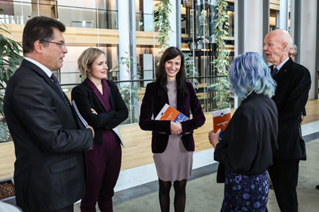The ‘Scientific Opinion on Strategic Crisis Management’

date: 13/12/2022
The Group of Chief Scientific Advisors to the European Commission and the European Group on Ethics in Science and New Technologies handed over to Commissioners Gabriel and Lenarčič the ‘Scientific Opinion on Strategic Crisis Management in the EU’, informed by the Evidence Review Report prepared by the Science Advice for Policy by European Academies (Sapea) consortium, and the Statement on ‘Values in times of crisis’ respectively on the 22nd of November 2022 at the European Parliament in Strasbourg.
The Scientific Opinion and the Statement are complementary in that they consider differently crucial aspects of strategic crisis management. The former is based on a large evidence review provided by the Sapea consortium that considers a wide spectrum of available scientific and technical expertise, lessons learnt and practice on crisis management. The latter stems from the recognition that in any crisis facts and values cannot be really disentangled and ethical concerns are sometime at the heart of very complex decisions that have to be made in order to save lives and maintain livelihood of communities as much as possible.
The recommendations provided by the GCSA tackle in a comprehensive fashion the multiple fundamental aspects of strategic crisis management under six main key recommendations, covering governance aspects, the resilience of critical infrastructures, financial and economic tools for resilience, building and maintaining trust with citizens empowered and participating to crisis mitigation efforts, and last but not least information and data management systems supporting all the above activities and permitting to the vast array of stakeholders to share information for increased situational awareness.
In the Statement the EGE point out that making explicit the values that shape our understanding of crises and our responses to them is important in a democracy – because it opens them up to public scrutiny and appeal. Value transparency is a prerequisite for an ethically justified crisis management framework, one that is based on solidarity, equality, trustworthiness, and participation. Among other important values, some of which are enshrined in human rights, solidarity is particularly relevant in this context and it actually is the base of the role of the EC in civil protection and humanitarian aid.
For the handover: Watch the ceremony
